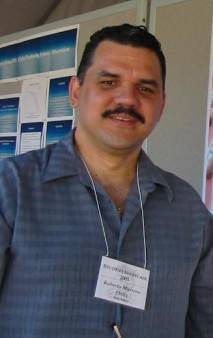
Roberto Marrero-Ortiz

Roberto Marrero-Ortiz is from Puerto Rico. He is married to Awilda Baez-Velazquez and has two children, Roberto Yadier and Maria Victoria.
His undergraduate course work was obtained at the University of Puerto Rico, where he majored in education with a concentration in Biology and Chemistry. Roberto was also a mentor for high school students from 1991-2004. In the summer of 1995, Roberto participated in a TRAC summer institute at the Lawrence Berkley National Laboratory at the University of California of Berkley. This wonderful experience was an innovated one where he had the opportunity to work with Dr. Mike Palazzolo in the Human Genome Project. In 2000, he participated in the Biodiversity Institute at the Woodrow Wilson National Fellowship Foundation at Princeton University.
In 2002, Roberto finished his thesis where he investigated the characterization of organic contamination, PCB and PAH of the water in the San Juan Bay. He has published articles on organic contamination and had the opportunity to present it in international debates such as the Society of Environmental Toxicology and Chemistry in 1997 in San Francisco, California. He also participated in the International Symposium of Environmental and Analytical Chemistry (IEAC), in Geneva Switzerland. In 1998 he was awarded with the Scientific Leadership Award from the Medical Sciences Campus, University of Puerto Rico where he also recieved several recognitions as Excellence Science Teacher Award. Roberto continues to enjoy teaching science and participates actively in workshops, conferences and seminars to develop strategies to improve teaching methods. Currently, he is a Ph.D. student at the Department of Soil, Water and Environmental Science at the University of Arizona.
Current Project:
Assessment of the Microbial Water Quality of Individual and Small Systems Groundwater Supplies in Arizona
Arizona has more non-disinfected drinking water supply systems than any other state. All of these systems depend on groundwater that is subject to contamination by enteric waterborne pathogens originating from septic tanks and leaking sewer lines and also waterbased pathogens, which can grow in the groundwater and distribution systems. The goals of the Arizona Small System (AZSS) Project are to: 1) assess the microbial quality of non-disinfected individual and small groundwater systems in Arizona, 2) identify potential sources of contamination, and 3) evaluate appropriate technology for enhancing the microbial quality of the drinking water in these systems. Microbiological parameters (total and fecal coliforms, streptococci, somatic and male specific phage and heterotrophic bacteria), the presence of Helicobacter pylori and Aeromonas hydrophila, metals and physicochenmical parameters were determined in 26 private wells. Forty-two percent of the wells were positive for total coliforms bacteria and 15% were positive for the presence of the fecal coliforms bacterium. Thirty-three percent of the wells were positive for enterococci and 57% were positive for the emerging pathogen A. hydrophila. Fifty-eight percent of the wells exceed at least one primary contaminant (arsenic, nitrate and Coliforms) and 75% exceed one secondary contaminant (aluminum and TDS). Eighty percent of the wells exceed at least one national primary and one secondary contaminant. H. pylori and enterovirus were not detected by PCR analysis. A secondary evaluation of the wells is underway, including the detection of norovirus and adenovirus.
